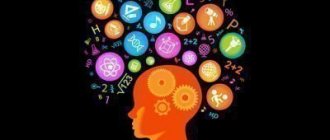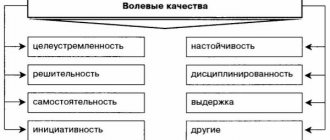Personal self-realization
What personal self-realization is can be explained from the point of view of several aspects:
- it is an activity inherent in every person;
- this is a process of self-knowledge with the aim of developing one’s own abilities and talents;
- This is the implementation of priority personality qualities in order to achieve certain goals.
But in any of the options, an integral part is activity as a condition for the self-realization of the individual, based on self-development and self-improvement. It is important to understand that this is a long and continuous process, the success of which is determined by many indicators and structure.
The structure of personal self-realization is a set of interconnected components:
- independence, manifested in the ability to plan one’s activities, regulate, control and focus;
- freedom, which determines the individual’s ability to behave autonomously (freedom of choice, decision-making, etc.), self-regulation and intersubjective interaction;
- creativity, allowing you to show creativity in your activities.
Due to the fact that the period of potential realization is quite long, the goals of this process may change depending on the life stage at the moment.
Personal self-realization goals
The process of personal self-realization can be divided into the following stages of life:
- childhood;
- youth;
- maturity.
In accordance with these periods, attitudes and goals of self-development and self-expression are formed:
| CHILDHOOD | YOUTH | MATURITY |
| · studies – aimed at developing mental abilities, developing skills and developing character; · communication with other children – contributes to the formation of personality, identification of strengths and weaknesses; · development of creative potential in the process of self-determination | · choice of direction for professional implementation; · choosing a life partner; · intellectual development; · knowledge of the basics of intimate relationships; · improvement of the physical and spiritual sphere | · achieving a high level of professionalism and expanding competencies; · determining one’s own importance and forming relationships in the work team; · building harmonious relationships in the family; · achieving the desired social status in society |
Thus, we can conclude that the goal of self-expression in any form and age is the manifestation of individuality, the realization of potential in various areas of life. The formation of self-realization goals largely depends on what type of family model was created by the parents, and what stage of the family life cycle you are currently at.
Self-realization of personality according to A. Maslow
Personal self-realization is presented in the theory of A. Maslow, which is based on the existence of various types of needs in a person, and therefore on the need to satisfy them. This system is called “Maslow’s Pyramid”, the base of which includes basic needs (hunger, thirst, sleep, etc.). The closer to the top of the pyramid, the less significance and urgency of their satisfaction, and, accordingly, the lower the degree of motivation.
According to the theory, the main factors in the self-expression of an individual are the types of unsatisfied needs, since they are the ones that are relevant to the individual and motivate action. Conventionally, needs are divided into three groups:
- instinctive;
- basic;
- sublime.
The needs of the first group are dominant, and each subsequent one is activated only when the descending ones are satisfied. A person’s desire for self-realization is the highest point of his development and is at the top of desires according to the pyramid of needs of the American psychologist Abraham Maslow.
Lesson summary on the topic “Human Freedom”
LESSON PLAN No. ___
Discipline:
social science
Subject:
Human freedom
Purpose of the lesson:
create conditions for students to develop an idea of personal freedom in its various manifestations and signs of a free society as the most important values of modern civilization
Planned results
Subject:
possession of the skills to identify cause-and-effect, functional, hierarchical and other connections of social objects and processes.
Metasubject:
independently carry out, control and adjust activities; use all possible resources to achieve set goals and implement activity plans; choose successful strategies in various situations.
Personal:
civic position as an active and responsible member of Russian society, aware of their constitutional rights and obligations, respecting law and order, having self-esteem, consciously accepting traditional national and universal, humanistic and democratic values
Standard time:
2 hours
Type of lesson:
informational lecture
Lesson plan:
- Freedom as a condition for personal self-realization.
- Human freedom and its limiters (internal - from the person himself and external - from society).
- Choice and responsibility for its consequences.
- Civic qualities of the individual.
- Lawful behavior - as a life guide and value.
Equipment:
textbook, notebook.
Literature:
Vazhenin A.G. Social studies for professions and specialties in technical, natural science, and humanities.
Social science. 10 grades Bogolyubov L.N., Averyanov Yu.A, Belyavsky A.V. and others. M.: Education, 2014
Teacher: Shumskaya N.V.
Topic: Human freedom
Plan:
- Freedom as a condition for personal self-realization.
- Human freedom and its limiters (internal - from the person himself and external - from society).
- Choice and responsibility for its consequences.
- Civic qualities of the individual.
- Lawful behavior - as a life guide and value.
Question 1. Freedom as a condition for personal self-realization.
We often hear expressions like “the desire for freedom as personal self-realization”, “freedom is the goal of self-realization.” The question arises: is freedom the self-realization of the individual, is there a confusion of concepts here?
In order to understand whether the expression “freedom as self-realization of the individual” makes sense, it makes sense to first understand what the concepts of “personality”, “self-realization” and “freedom” are.
There are many definitions of the concept “personality”. Their main meaning boils down to the fact that the individual
- this is a certain set of habits and preferences developed by a person, which are influenced by social experience and education.
Personality is formed in specific social conditions, which largely determine his behavior in various situations.
Self-realization
- this is the identification and realization by a person of his capabilities and abilities - both creative and personal. Self-realization is, in fact, self-affirmation of oneself as an individual.
Liberty
– this is a person’s ability to make an informed choice, the justification for which is his interests and aspirations, this is the opportunity to create conditions for the realization of himself as an individual.
Now let's return to where we started - is the expression “freedom as self-realization of the individual” one that makes sense, is freedom the goal of self-realization?
Based on the above generalized interpretations of basic concepts, we can conclude that self-realization is an action aimed at developing one’s capabilities and asserting oneself as an individual, and freedom is the opportunity to create conditions for this, a means to achieve these goals.
We need freedom for a reason, but precisely as an opportunity, as a tool for self-realization.
Therefore, the phrase “freedom as the self-realization of the individual” should not be used; it would be more correct to say “freedom as a means for the self-realization of the individual.”
Question 2. Human freedom and its limiters (internal - from the person himself and external - from society).
There cannot be absolute, unlimited freedom, because... complete freedom for one would mean arbitrariness in relation to the other. In the exercise of his rights and freedoms, each person shall be subject only to such restrictions as are intended to ensure recognition and respect for the rights of others. And one of the limiters here is the rights and freedoms of other people.
Let's consider the situation. Modern society provides a person with a variety of means to help get rid of a depressed state. Among them there are those (alcohol, drugs) that inexorably destroy the human body. When making his choice, a person who knows about such a danger can neglect this, but then he will inevitably face retribution, and he will have to pay with the most precious things - his own health, and sometimes life.
In other words, a truly free person will not be a slave to his momentary moods and passions. He will choose a healthy lifestyle. In this case, in addition to the perceived danger, a person is encouraged to act one way and not another by certain social conditions.
Responsibility - adverse consequences in case of violation of established rules, this is a restriction of human freedom.
External - moral norms, law, traditions, customs, public opinion.
It manifests itself primarily in a person’s conscious readiness to follow established norms, evaluate his actions in terms of their consequences for others, and accept sanctions in case of violations.
As psychologists' research shows, most people tend to accept responsibility for their actions. However, situations arise when the sense of responsibility becomes dull.
Thus, a person in a crowd is capable of such actions - offensive shouts, resistance to law enforcement officials, various manifestations of cruelty and aggression that he would never have committed in a different situation.
In this case, the influence is exerted not only by the massiveness of the speeches, but primarily by the anonymous nature of people’s activities.
Question 3. Choice and responsibility for its consequences.
Freedom Core
is a choice that is always associated with a person’s intellectual, emotional and volitional tension (the burden of choice). Society, through its norms and restrictions, determines the range of choices. This range also depends on the conditions for the realization of freedom, the existing forms of social activity, the level of development of society and the place of a person in the social system.
Freedom is a specific way of being for a person, associated with his ability to choose a decision and perform an action in accordance with his goals, interests, ideals and assessments, based on an awareness of the objective properties and relationships of things, the laws of the surrounding world.
Freedom exists where there is choice. But only freedom of choice gives rise to individual responsibility for the decision made and the actions that result from it. Freedom and responsibility are two sides of human conscious activity. Freedom creates responsibility, responsibility guides freedom.
Responsibility is a socio-philosophical and sociological concept that characterizes an objective, historically specific type of relationship between an individual, a team, and society from the point of view of the conscious implementation of mutual requirements placed on them.
Responsibility, accepted by a person as the basis of his personal moral position, acts as the foundation of the internal motivation of his behavior and actions. The regulator of such behavior is conscience.
The following types of responsibility are distinguished:
- historical, political, moral, legal, etc.;
- individual (personal), group, collective.
Social responsibility is expressed in a person's tendency to behave in accordance with the interests of other people.
As human freedom develops, responsibility increases. But its focus is gradually shifting from the collective (collective responsibility) to the person himself (individual, personal responsibility).
Only a free and responsible person can fully realize himself in social behavior and thereby reveal his potential to the maximum extent.
Question 4. Civil qualities of the individual.
The civic qualities of an individual stem from personal qualities, and are also in close relationship with each other, combine with each other and form a certain integrity, unity.
Education of an individual's citizenship is determined by the objective state of society, the level of development of democracy, and humanity. The main features of a person’s civic appearance are laid down in childhood, adolescence, and youth on the basis of experience acquired in the family, school, and social environment, and are subsequently formed throughout a person’s life.
The main elements of citizenship include moral and legal culture, expressed in self-esteem, internal personal freedom, discipline, respect and trust in other citizens and in government, the ability to fulfill one’s duties, a harmonious combination of patriotic, national and international feelings. Moral culture is based on universal human moral values, and legal culture acts as the subjective basis and prerequisite for the existence of a rule of law state, which is characterized by a high degree of demand for the civil qualities of people.
The main goal of civic education
- nurturing in a person the moral ideals of society, a sense of love for the Motherland, a desire for peace, and the need to work for the good of society.
civil position
is a system consisting of three structural elements:
– emotional-sensual component – a set of civil feelings of the individual, which include feelings of duty, honor, dignity, awareness of civil requirements and internal attitudes regarding the correctness of the chosen behavior;
– intellectual component – a set of ideological civic views of an individual: from simple knowledge about the state, the rights and responsibilities of citizens to broad moral and political generalizations, in other words, to the development of civic thinking, by which we mean the ability to comprehend, analyze, compare, generalize, evaluate complex socio-political phenomena occurring in Russia and the world, establish their interconnection and inconsistency;
– an activity component that characterizes the readiness to use knowledge and beliefs in life and is expressed in civic responsibility and activity of the individual.
Civic Qualities
– these are personality qualities that characterize her ability to actively demonstrate her civic position through socially significant, practice-oriented activities.
Patriotism, respect for the law, tolerance, high morality, love for the Motherland, selflessness in its name, concern for the fate of one’s country, activity in the life of one’s state.
Question 5.
Lawful behavior - as a life guide and value.
Lawful behavior is behavior that complies with legal norms and does not violate them. Such behavior, as a rule, has a social benefit and is approved by society. The following signs of lawful behavior can be noted:
— lawful behavior is limited by established legal norms. - lawful behavior is useful for society; it does not contradict its interests and goals. In this regard, necessary (desirable) and undesirable, but socially acceptable, lawful behavior is distinguished. - lawful behavior is carried out voluntarily
and
conscious
basis.
- lawful behavior must be common among the majority
population (which does not exclude different attitudes of people towards the law), otherwise (mass violation of legal norms) society would cease to function normally (which usually occurs during revolutions, civil wars or other social cataclysms).
What makes the majority of the population act lawfully? Fear due to possible legal liability? Fear of punishment? Personal beliefs? Habit?
In order to answer these questions, let us consider in more detail the types of lawful behavior that are distinguished depending on the main motive.
Socially active behavior
— the highest form of lawful behavior, corresponding to a high level of legal awareness and legal culture, responsibility and voluntariness.
Conformist behavior
based on submission to legal regulations without their deep and comprehensive awareness, without high legal activity.
Marginal legitimate
behavior also complies with legal regulations, but is under the influence of state coercion, dictated by fear of punishment.
The meaning of social
The premise is that people always act in a certain social environment, which has a wide variety of influences on them. After all, you and I are participants in many social connections, each of which to a certain extent influences human behavior.
A prerequisite for lawful behavior is people’s understanding of the justice and usefulness of legal institutions, social maturity and legal literacy. Lawful behavior is based on a developed legal consciousness and legal culture, which make it possible to distinguish acceptable behavior from unacceptable behavior. A high level of legal awareness of society and the individual determines the legal culture of the entire society and contributes to the development and dissemination of lawful behavior.
Questions for self-control:
- Define the concept of “freedom”.
- What can unlimited freedom of choice lead to?
- What is the connection between the concepts of “freedom”, “choice”, “responsibility”?
- What are “civic qualities of a person”?
- Name the types of lawful behavior.
The problem of personal self-realization
According to statistics, approximately 4% of people are able to reach the top of the pyramid of needs. The problem of personal self-expression most often lies in the fact that the closer to the final stage of this system, the less a person is aware of his desires and abilities, as a result of which he is not able to move in the right direction, achieving success with a sense of satisfaction.
In addition, there are other enemies of personal self-realization:
- psychological aspect - the discrepancy between intellectual and energy potential, the degree of development of skills and the implementation of experience in the real world;
- unfavorable geographical environment;
- presence of physical defects or limitations (blindness, hearing loss, etc.);
- cessation of the prospect of realizing one’s own talents or genius abilities (for example, as a result of illness or injury);
- limited material well-being or financing of the project by third parties.
Thus, human self-expression is impossible in the absence of conditions for its implementation. For example, a woman’s desire to become a mother cannot be realized if she is single or cannot have children for medical reasons.
Understanding freedom in the modern world
In the ancient world, freedom was a luxury, since not everyone could have it. There was a clear division between people of noble pure blood and slaves who did not have freedom. With the exception of those individuals who became slaves due to debt. A couple of centuries ago, serfdom existed in Russia, under which the free actions of some residents of the country were severely limited.
The slave did not have the opportunity to express himself, and therefore to develop too. His main task was always to carry out orders from his masters. They were responsible for their subordinates.
In the modern world, things are a little different. Here, with the abolition of slavery and serfdom, the concept of will was distorted and acquired a completely new meaning. In real time, independence manifests itself in the form of the ability to independently make choices and accept the consequences that arise from them. The only condition is not to go beyond what is permitted by society. Simply put, people are given the full right to choose, but only from the options offered. But this is enough for effective self-actualization.
Awareness of the will of choice and independence occurs in two stages:
1. Conscious need.
An internal moment in which an individual only thinks about the meaning of life, the people around him and the ability to choose how to move on, with whom to communicate.
2. The ability to choose.
So the first stage smoothly flows into the second, where the person has already thought about the fact that she will have to either make her choice or create new opportunities for this.
Factors contributing to personal self-realization
The conditions for personal self-realization are divided into two components:
- upbringing;
- education.
Each social community develops its own system of educational and educational processes. That is, traditions accepted in society influence the formation of skills, abilities and motives for realizing one’s own potential.
In addition to these factors, experts identify other conditions for the development of personal self-realization:
- Absence of restrictions of any nature (physical, moral, material).
- Independent control of ongoing life processes (lack of pressure from loved ones, independent decision-making, etc.).
- The ability to adapt to changing environmental circumstances.
- Creative potential.
- Ability to make decisions.
Self-realization is impossible without individual determination and self-confidence. The set goal can be achieved only with hard work, independence and potential.
Areas of personal self-realization
Each person's abilities can manifest themselves in different areas. For some in creativity, for others in profession, and for others in science or sports. Few people succeed in achieving equally high performance in several areas of life at once, because most often all resources and opportunities are aimed at one specific goal.
To determine your direction, just follow a simple algorithm:
- Objectively evaluate your talents and abilities. It is easier to develop and implement those areas in which there is great potential and talent.
- Analyze your positive and negative qualities without focusing on the opinions of others.
- Highlight all types of activities in which you are interested in realizing yourself.
- Next to each activity marked, write down the qualities that will help you achieve success.
- Analyze the result. Setting priorities and identifying talents will allow you to correctly determine the direction in which you are more likely to achieve success.
Development of potential is not necessarily possible only in creative terms. That's why there are several types of self-expression.
Why is self-realization so important?
Every person from birth has the ability to realize internal reserves in one way or another. It is self-realization that plays a major role in determining personality, identifying the individual’s talents and capabilities, even those that are not obvious. Thanks to this, life in society becomes more successful and stable.
In addition, problems with self-realization may appear in childhood, which will accompany a person for many years. It is necessary to identify them and decide what requires targeted work. The biggest enemy of self-realization is stereotypes. Thinking based on them is widespread in society and is often imposed in early childhood.
Types of personal self-realization
Experts identify three main directions or types of personal self-realization:
- professional;
- creative;
- social.
Most often, only one type of the presented options is a priority for an individual.
Professional self-realization of personality
What is professional self-realization is the achievement of the set goals of work, in accordance with the chosen profession and the position held at the moment.
For men, in most cases, a career is seen as a way of personal self-realization. The disclosure of a person’s potential occurs in conditions of socially useful activity, therefore, the broadest prospects open up in the professional sphere.
Self-expression in this direction is characterized by the formation of professional thinking:
- understanding of one’s own belonging to the chosen profession;
- awareness of one’s place in the hierarchy of professional profiles;
- assessment of the degree of recognition in a given professional field;
- understanding your strengths and weaknesses in this aspect, adequately assessing successes and failures;
- understanding the prospects for further development in work and its role in life in general.
The listed characteristics allow us to determine the level of professional self-realization.
Creative self-realization of personality
Creativity is an integral aspect of human activity. The material wealth that surrounds us is the result of the work of scientists and great masters. Creative activity is the basis of technical progress, development of the material and spiritual sphere of humanity. That is why there is a direct connection between the implementation of a person’s creative abilities and the implementation of socially significant aspects of society.
Experts argue that the most complete development of creative abilities is manifested when implemented in socially significant activities. But at the same time, the internal needs of the individual must be taken into account. As a result, in the process of creative self-expression, a personal worldview is formed. The successful result of realizing potential in this area is the creation of a masterpiece in the field of art or a scientific discovery that contributes to the development of humanity.
Social self-realization
Social self-realization affects such an important aspect as relationships with people. Therefore, the goal of this type of development of one’s own potential is to build relationships that will bring a sense of satisfaction and a sense of happiness, freedom, and independence. At the same time, the individual is focused on the only necessary actions for himself, and not those imposed by society.
As a result of social self-realization, such personality qualities as responsibility, sociability, hard work, etc. are formed and developed. This type is characterized by the statement “I am for others.” In this case, professional recognition or a high level of income is not guaranteed; success for an individual is the opportunity to carry out activities for other people.
Driving forces of self-realization
It is clear that creative and professional self-realization requires long and hard work. Often a person needs motivating factors; they need to be looked for among universal human values:
- need for recognition and respect;
- desire to set personal records;
- desire to show intelligence;
- desire to start a family;
- the need to occupy a certain social position.
It is important! Motivating factors are accessible and understandable. The ideals that a person strives for are varied. That is why there are no time limits for achieving your goals. But it is necessary to remember that only in activity does the self-realization of the individual occur.
Ways of personal self-realization
Methods of human self-realization are directly related to types of potential development. Every day we demonstrate our qualities, abilities and skills in work, in our profession, and in communicating with people. Now another method is intensively developing - the information network.
Despite this, the most relevant way of personal self-realization is creativity. Even if you have no ability for art or science, you should not deny this method of personal self-realization. The creative aspect can be present when solving professional problems or life problems in any field. This method of self-expression promotes maximum potential, self-development and achievement of goals in various areas of life.
Professional self-realization
Professional self-realization, as one of the most important forms of life self-realization, which is characterized by a high level of personal potential disclosure:
- The specialist has an expressed need for continuous professional development;
- A high level of disclosure of the personal potential and abilities of a specialist in a certain profession;
- Achievement by a specialist of his professional goals;
- Recognition of a specialist’s achievements by the professional community, widespread use of his professional experience and achievements;
- Continuity - constantly setting and achieving new professional goals;
- High level of creativity in professional activities;
- Formation of your own “vital professional space”.
Professional self-realization occurs through two interrelated ways:
- 1. Outwardly professional - achieving significant achievements in various aspects of professional activity;
- 2. Internally professional - professional self-improvement aimed at increasing professional competence and developing professionally important qualities.
Strategies for personal self-realization
The process of self-realization continues throughout life, but the actions aimed at it change depending on the setting of married goals and circumstances. That is, in other words, a person at different stages of life adheres to a certain strategy of self-realization.
If at the initial stage a person strives to receive upbringing and education, and then chooses a life partner and profession, it will not be possible to carry out the same algorithm of actions, it will have to be changed in order to achieve the desired result.
The choice of a specific self-realization strategy depends on age, character, desires and needs. But there are often cases when you have to act “here and now,” for example, when the course of action is obvious or there is no time to think about it.
Self-realization is an integral part of the development and formation of personality. A person has the right to independently choose the direction for self-expression: creativity, profession or family. In the process of growing up, the algorithm of actions for self-realization changes depending on the change in priorities at each specific stage of life. Freedom, responsibility and personal self-realization are interconnected components that allow you to achieve goals and success in life.
The role of will in self-improvement
Sometimes some people do not have enough personal independence to perform any actions. For example, in childhood, strict parental control manifests itself, and the right to choose passes into the hands of elders. As for adult life, here too many unpleasant factors block our path to self-development. This may be a lack of free time, low earnings, or the imposition of one’s opinion by society. If you overcome all this pressure from the outside, you can achieve a lot in life, the main thing is not to be afraid to act!
There are times when internal doubts and experiences become an obstacle to personal freedom. For example, the most frequently asked questions are: “What if I don’t succeed?”, “What will people say?” and so on. That is why you need to make every effort to work on yourself in order to deal with your fears and thoughts, find talents, abilities and skills, and then significantly improve them.
Responsibility for your choice
Freedom comes with consequences that fall on your shoulders. Therefore, any choice you make is a big burden of responsibility for your actions. In this case, the phenomenon is conscious activity. Every word, action or even reaction, all this becomes the beginning of inevitable consequences for which you need to be prepared.
By reaping the rewards of doing things, we can get both positive and negative results. In other words, the consequences can be completely different. For example, we decided to become better and are firmly moving towards this; such a decision will most likely have a positive result. To a lesser extent, the opposite effect is also possible. For example, we could not keep our promises and did not cope with the task, then the result will be rather unpleasant.
IMPORTANT! Before taking any action, especially in a society where there are free limits, it is worth thinking more than once about the consequences that it will bring. Only a free person, responsible for his actions, can fully develop and effectively reveal his potential.
We recommend:
- Create a suitable environment for the improvement and development of your nature. If you follow these rules, the process of your development will accelerate, and very soon you will notice great progress in working on yourself.
- Dispel fears and doubts. Freed from mental shackles, you will find real scope for decisive life changes.
- Overcome internal barriers and limitations. Only by destroying them can you proceed further.
- Protect yourself from external pressure. Each person has their own opinion, this is inevitable, but it is not always necessary to listen to it, because you have your own personal opinion.
- Accept responsibility for all your actions. Full awareness of the sense of responsibility for what you do makes you ready for further self-realization.
- Reflect and identify what is limiting you at the moment. And it is advisable to eliminate the trouble so that in the future nothing will interfere with the further development of events in the right direction.
- And finally - start your changes If you have decided to progress, become more perfect and smarter, then perhaps now is the best time for this!










